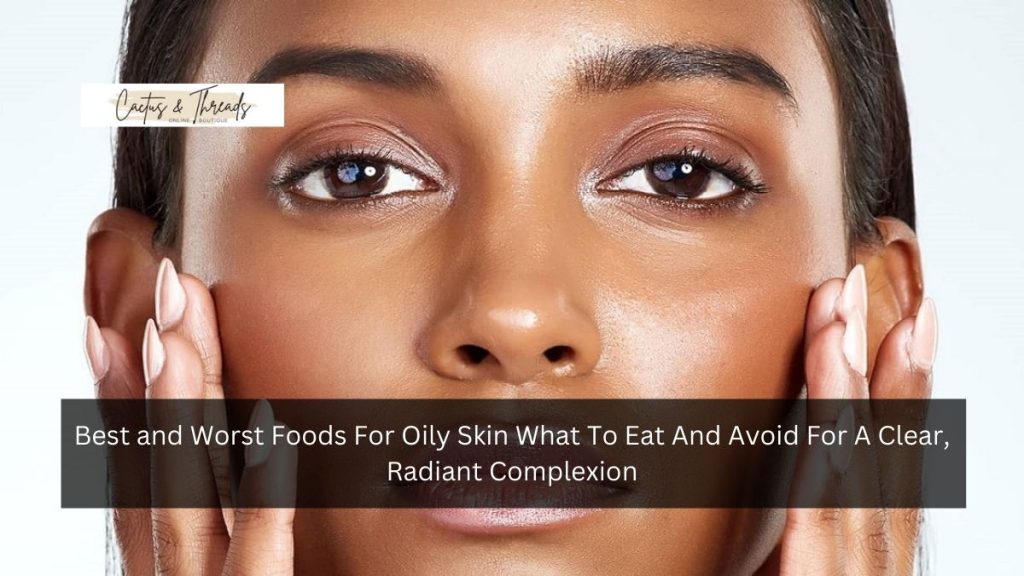
The things you eat affect your skin’s health, especially if you have oily skin. While many people rely on topical products to manage excess oil production, breakouts, and clogged pores, adjusting your diet can work wonders for improving skin condition.
This article explores which foods can help control oily skin and which may exacerbate it. With a focus on nutrient-rich options, you’ll discover easy dietary tweaks that can make a significant difference.
Why Diet Matters for Oily Skin
What you eat is really important for keeping your skin healthy. Having oily skin is often caused by making too much sebum, which can block pores & cause acne, blackheads, and other skin issues. Certain foods can stimulate or reduce this oil production.
Dietitians and dermatologists have long emphasized that a balanced, nutritious diet can aid in managing skin concerns, particularly for those with oily skin.
Foods to Eat for Oily Skin
Here are some nutrient-packed foods that can help regulate oil production and keep your skin looking clear and radiant:
1. Cucumbers
Cucumbers are an excellent hydrating food, composed of more than 95% water. Hydration is vital to balancing oily skin because dry skin can sometimes lead to an overproduction of oil. Also, cucumbers have antioxidants that can reduce inflammation and lower the chance of getting acne.
2. Whole Grains
Whole grains such as oats, brown rice, and quinoa have lots of fiber and important nutrients that help the skin. Fiber helps regulate digestion, ensuring that your body eliminates toxins that could otherwise appear as skin issues. Whole grains also prevent spikes in blood sugar, which can trigger more oil production.
3. Nuts (in moderation)
Nuts like walnuts and almonds can make your skin better by reducing swelling and making it smoother. But don’t eat too many, or it could make your skin oily.
4. Avocados
Avocados have good fats that help keep your skin hydrated. They are also rich in vitamins like vitamin E, which is crucial for skin repair and regeneration. The antioxidants in avocados, such as lutein and beta-carotene, promote healthy skin and reduce oil production.
5. Spinach and Leafy Greens
Leafy greens like spinach, kale, and broccoli provide essential vitamins like vitamins A, C, and E, which help manage oil production and reduce acne. The fiber in these vegetables helps clean the body, which can make the skin look better.
6. Bananas
Bananas are rich in potassium and vitamins, which help control excess oil production and keep skin clear. Their detoxifying properties can also reduce the appearance of large pores and prevent dirt buildup that leads to breakouts.
7. Oranges and Other Citrus Fruits
Fruits like oranges, lemons, and grapefruits have lots of vitamin C, which is important for keeping skin healthy. Vitamin C helps protect the skin from harm and helps make collagen to keep it strong and smooth.
8. Lentils and Pulses
Lentils and pulses are excellent sources of plant-based protein and complex carbohydrates. These nutrient-dense foods help balance hormone levels, preventing the excess oil production that can lead to clogged pores and acne.
Foods to Avoid for Oily Skin
While there are plenty of foods that can help manage oily skin, some can trigger excess oil production and should be avoided:
1. Dairy Products
Milk, cheese, and other dairy foods can make your skin produce more oil and cause acne. If you have oily skin or get pimples, try eating less dairy.
2. Caffeine
Caffeine can dehydrate the skin, leading to overcompensation by the sebaceous glands, which produces more oil. If you can’t completely eliminate caffeine, try to reduce your consumption or opt for healthier alternatives like herbal tea.
3. Refined Carbohydrates
Refined carbs, such as white bread, pasta & sugary cereals, spike blood sugar levels, leading to inflammation and increased sebum production. Stick to whole grains to avoid exacerbating oily skin.
4. Sugary Snacks
Eating sugary foods like cakes, pastries, and soda can make your body produce more oil and cause breakouts. To get clearer skin, eat fruits for natural sugars and avoid processed sugars.
5. Fatty and Fried Foods
Saturated and trans fats found in fried foods, fast food, and junk food can increase inflammation, produce excess oil, and worsen acne. Instead, focus on consuming healthy fats from avocados, nuts, and seeds.
6. Alcohol
Alcohol makes the skin dry and produce more oil. It can also harm the liver, which makes the skin look dull and oily.
7. Spicy Foods
Spicy foods can increase body temperature and lead to more oil production. While spicy foods are fine in moderation, reducing their intake can help control oily skin, especially if you’re prone to acne flare-ups.
Additional Tips to Manage Oily Skin
- Stay Hydrated: Drink plenty of water daily to hydrate your skin and flush out toxins.
- Use Blotting Paper: If you struggle with oily skin throughout the day, use blotting paper to absorb excess oil without irritating your skin.
- Choose Oil-Free Skincare Products: Avoid clogging your pores by using non-comedogenic and oil-free skincare products.
Conclusion:
Taking care of oily skin involves more than just using skin products. It also involves eating the right foods and following a good skincare routine.
Eating foods like cucumbers, avocados, and whole grains can help reduce excess oil on your skin. Avoiding dairy and refined carbs can also help. It’s important to stick to these changes every day for the best results.







